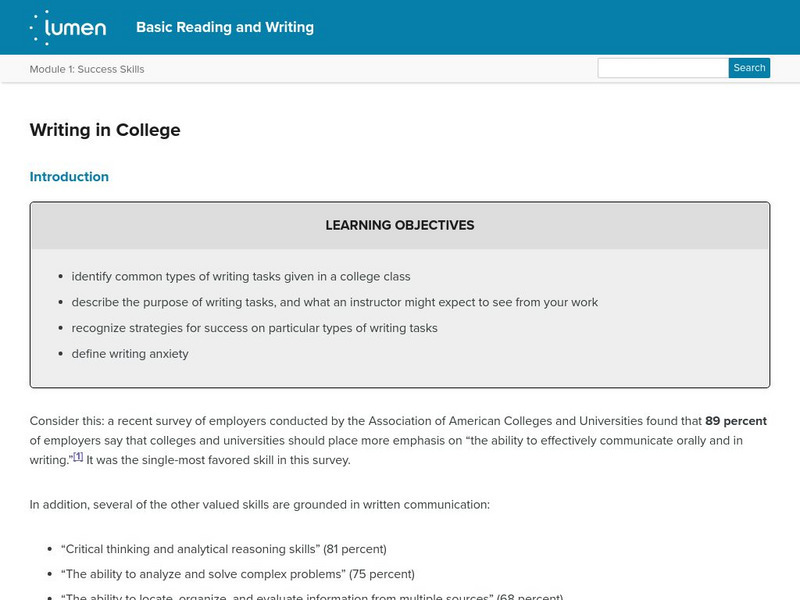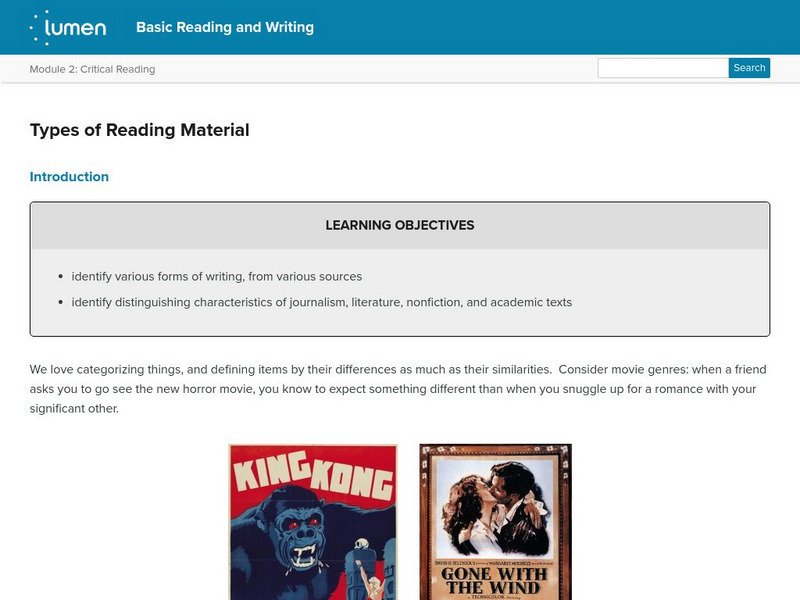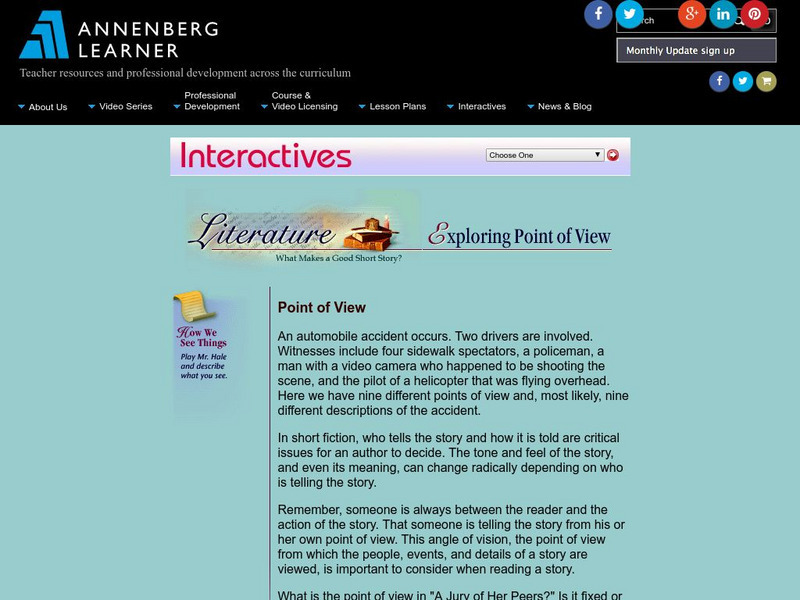Sophia Learning
Sophia: Comparing and Contrasting Texts
Two PowerPoint presentations and a video [2:57] on comparing and contrasting literary and informational texts as well as how to write a literary analysis. Includes links to external resources.
Other
The Dbq Project
Teach students how to read with understanding, think straight, and write clearly using document-based questions.
Sophia Learning
Sophia: Articles: Basic Rules for A, An, and The
This video focuses on English articles (a, an, and the) including definitions, pronunciations, the two types, and when and how to use them.
BBC
Bbc: Skillswise: Nouns
This Skillswise site focuses on nouns. Included are a video about why it is important to be able to identify nouns, fact sheets and worksheets for instruction, and quizzes on the information presented. The Skillswise sites from BBC are...
Annenberg Foundation
Annenberg Learner: Letters: Use Your Document Detective Skills
Read three letters, one at a time, about events of historical significance. Identify the region and era particular to each letter, and answer additional questions about the information it contains.
ReadWriteThink
Read Write Think: Poetry: Varying Views of America
Lesson allows students to examine the various views of American perspective through studying three poems by diverse poets: "I Hear America Singing" by Walt Whitman, "I, Too, Sing America" by Langston Hughes, and "On the Pulse of Morning"...
Tom Richey
Slide Share: Author's Purpose and Point of View
This downloadable slideshow focuses on how an author's purpose and point of view work together in fiction and nonfiction, and how to identify the point of view.
AdLit
Ad lit.org: Classroom Strategies: Double Entry Journals
The Double-Entry Journal strategy enables students to record their responses to text as they read. Students write down phrases or sentences from their assigned reading and then write their own reaction to that passage. The purpose of...
AdLit
Ad lit.org: Classroom Strategies: Paired Reading
The Paired Reading strategy encourages peer teaching and learning. Students are divided into pairs and read along together or take turns reading aloud to each other. Pairs can have the same reading ability or can include a more fluent...
University of California
History Project: Process of Historical Investigation [Pdf]
Outlines the process of historical investigation for students by teaching them the steps of research, analyzing evidence, and making interpretations.
Sophia Learning
Sophia: Audience and Writing Style
This slideshow tutorial focuses on adjusting writing style to fit the audience. It looks at audience characteristics and discusses how to adapt the vocabulary, sentence style, and tone to fit them. It provides an example using the topic...
University of North Carolina
Articles: The Writing Center
What is an article? Explore the world of articles when you visit this informative resource. Students and teachers can brush up on their knowledge of these tiny but important words.
Texas Education Agency
Texas Gateway: Compare and Contrast Similar Themes Across Time Periods
Compare and contrast similar themes from different genres and different time periods.
Lumen Learning
Lumen: Success Skills: Writing in College
Although this lesson focuses on college writing, it fits perfectly into the high school curriculum without being too difficult to understand. It provides types of essay writing assignments and how to handle each, strategies for writing...
Lumen Learning
Lumen: Critical Reading: Types of Reading Material
This lesson focuses on the types of reading material and their distinguishing features. It also included two videos including the key features from a newspaper story video and a video that defines scholarly articles.
Huntington Library
Huntington Library: Using Primary Sources in the Classroom [Pdf]
This lesson provides guidelines for teaching learners how to use primary sources such as images, text, or statistics (e.g., maps, census). Includes a document analysis worksheet.
Love To Know Media
Your Dictionary: Middle School Lesson for Who vs. Whom
This site offers two lessons with worksheets and answer keys on the use of who vs. whom as subjects and objects and relative pronouns.
Other
Library of Congress: Teaching With Primary Sources
This website is an excellent resource for teaching with primary sources. This resource features Holocaust lessons, lesson plan strategies, and podcasts.
Roy Rosenzweig Center for History and New Media
Teaching History: Interactive Historical Thinking Poster (Secondary)
This is an interactive historical thinking poster. History is an argument about the past. Constructing a narrative about history involves several tasks: Analyzing Primary Sources, Examining Source Information,Using Evidence to Support...
Annenberg Foundation
Annenberg Learner: Literature: Exploring Point of View
This page explains point of view by discussing examples of situations where mutiple people witness an event, but have different perspectives on what occured. It offers a link at the bottom of the page to information about types of point...
National Endowment for the Humanities
Neh: Edsit Ement: I'm Gonna Sit Right Down and Write Someone a Letter
Through the vast online resources available from EDSITEment, students can read the correspondence of the famous, the infamous and the ordinary, some of whom lived through extraordinary times. Use these fascinating letters as a starting...
CommonLit
Common Lit: Units: 9th Grade Thematic Unit: Education
Complete teaching unit for 9th Grade Thematic Unit: "Education." Students will read six informational texts focusing on the essential question: "How can education be used to create change?" They will gather information from their...
CommonLit
Common Lit: Units: Teaching Units
Complete teaching units (12) by grade level. CommonLit units are crafted to be both engaging and rigorous, featuring a variety of literary and informational texts from diverse sources. Reading, writing, and discussion are prioritized in...
CommonLit
Common Lit: Units: 9th Grade Thematic Unit: Love
Complete teaching unit for 9th Grade Thematic Unit: "Love." In this unit, 9th graders will read six texts that speak to the theme of love. They will revisit the essential question "What is love, and how does it change us?" throughout the...




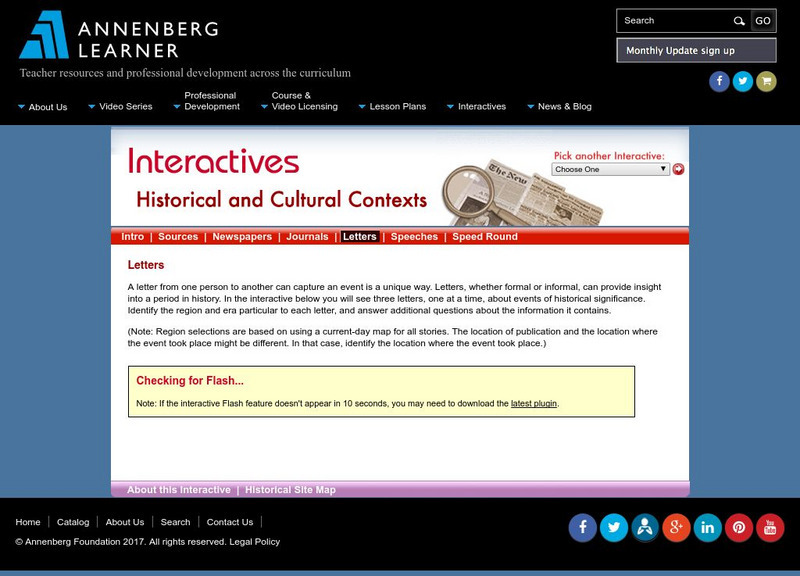
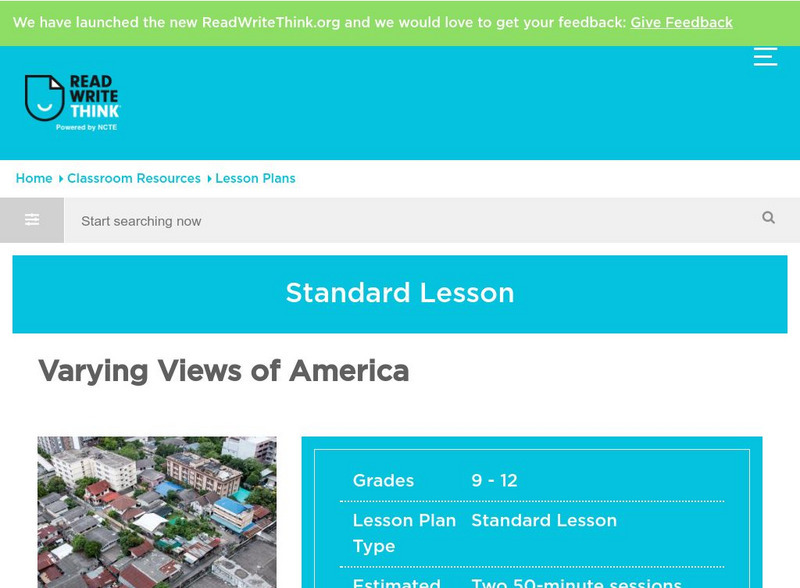



![History Project: Process of Historical Investigation [Pdf] Handout History Project: Process of Historical Investigation [Pdf] Handout](https://static.lp.lexp.cloud/images/attachment_defaults/resource/large/FPO-knovation.png)



